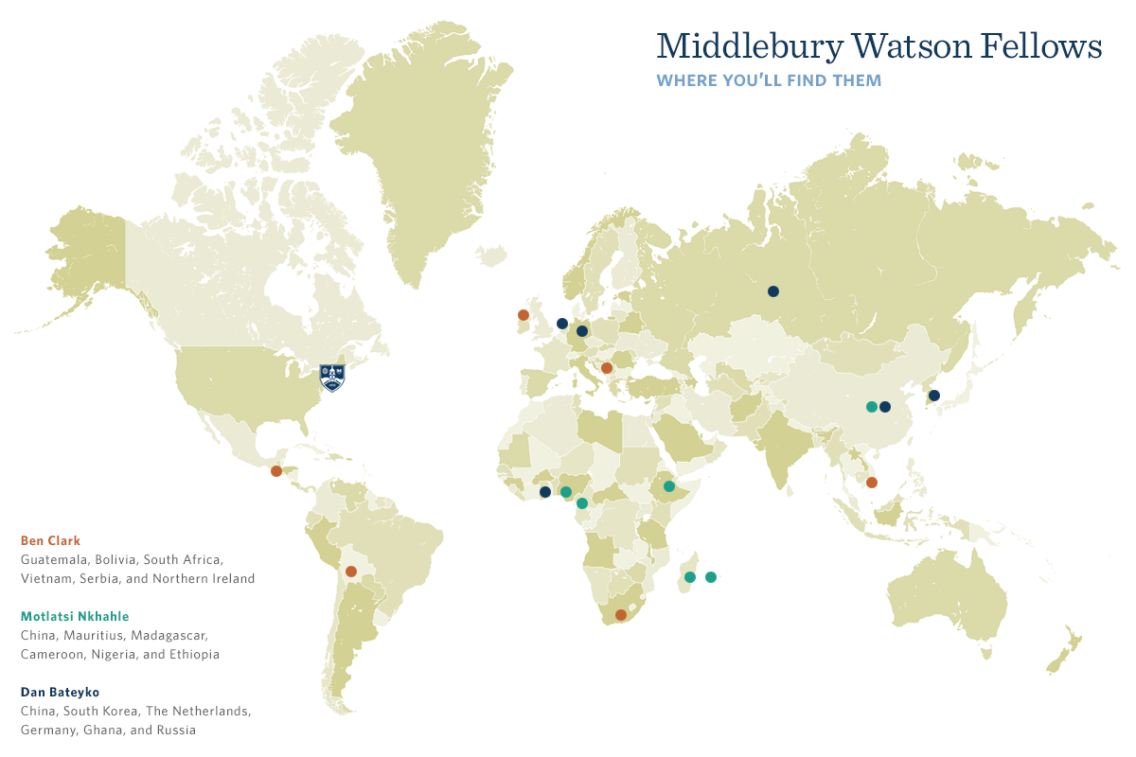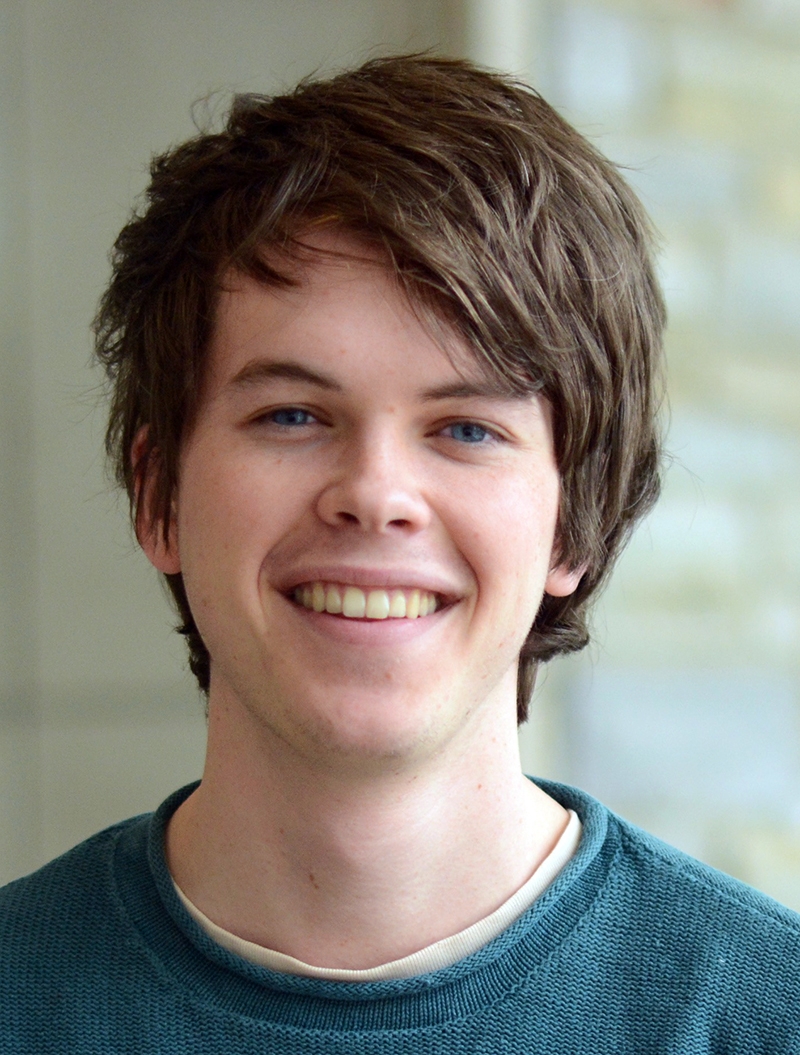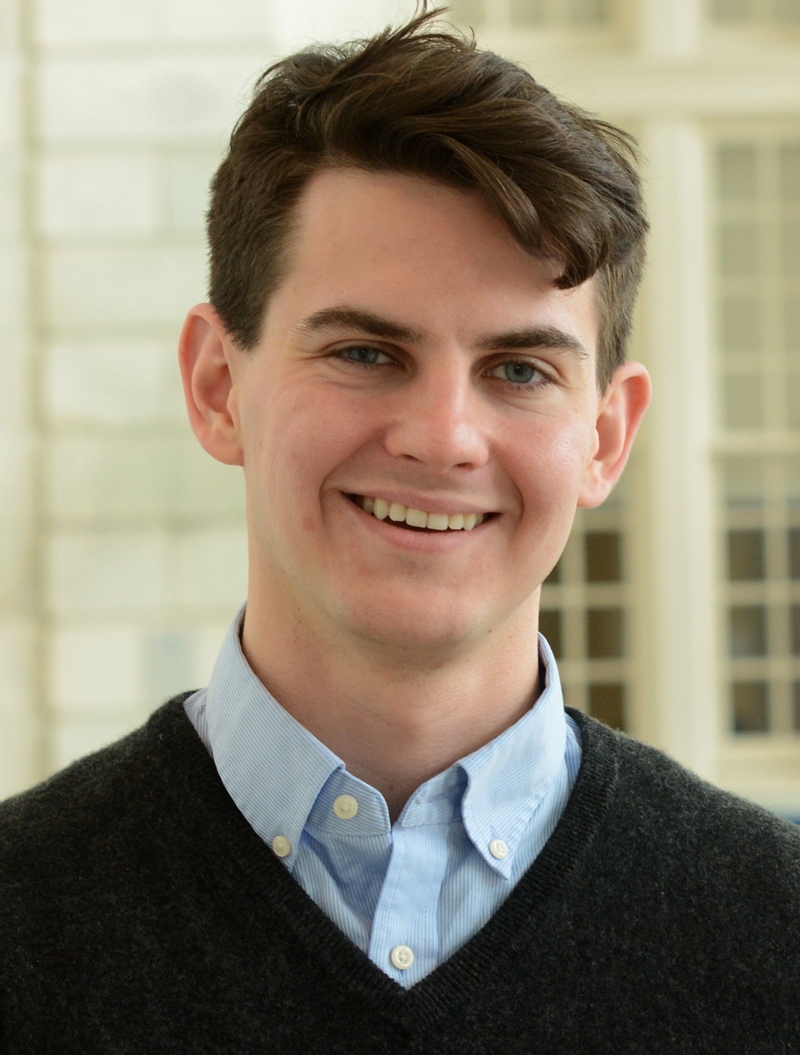Three Students Earn Watson Fellowships

MIDDLEBURY, Vt. – Three Middlebury students have been awarded the prestigious Thomas J. Watson Fellowship, which provides funding for a year of post-graduate international exploration. The $30,000 fellowship gives students an “opportunity to test their aspirations, abilities, and perseverance through a personal project that is cultivated on an international scale.”

Each of the foundation’s 40 partner institutions selects students to nominate for the fellowship. This year, of the 152 college seniors nominated nationally, 40 fellows were selected. Middlebury was the only college to earn three fellowships.
Ben Clark ’16, a history major from Atlanta, Georgia, designed a project titled, “Using History: Memory and Reconciliation in Spaces of Conflict.” Clark will spend his yearlong fellowship traveling in Guatemala, Bolivia, South Africa, Vietnam, Serbia, and Northern Ireland. He plans to conduct oral history interviews in each place he visits to better understand the individual stories that weave together the larger picture of a community.
“I feel very lucky to have connected with people in each country doing really meaningful work,” Clark says, “from social justice activists to farmers’ cooperatives, who I’ll be working with during my time in each community.”
Motlatsi Nkhahle ’15.5, a Chinese language and literature major from Mohale’s Hoek, Lesotho, will explore the complex relationship between Chinese populations living in Africa and African populations living in China. Through his project titled “Exploration of Community Coexistence Between Chinese and Africans,” he hopes to learn more about the challenges each group faces living in close proximity to one another.
“While there are many Chinese communities in Africa, the media often unfairly portrays Chinese people as constantly abusing Africans and the environment, with Africans in both China and Africa almost always portrayed as victims,” said Nkhahle. “The fact is that the relationships between Chinese and Africans in both landscapes cover the whole spectrum between good and bad. I want to live, at least for a short while, in these communities and experience life as just another African, observing situations and trying to make meaning.”

During his year of study, Nkhahle will travel to China, Mauritius, Madagascar, Cameroon, Nigeria, and Ethiopia. He says the opportunity to travel to other parts of Africa and live among different populations is a dream come true. “I look forward to personal connections I will make as I journey along, the numerous moments of loneliness that will urge me to socialize with other people, challenges with transportation, and other challenges that require personal experience to understand their real causes.”
Dan Bateyko ’16, an international and global studies major from Sarasota, Florida, will study local reactions to free speech barriers online in his project titled, “Advocates, Bloggers, and Trolls: Exploring Barriers to Internet Freedom.”
“Since I first went on the Internet, I’ve been curious about how we communicate with each other and how the websites we use shape our conversation,” said Bateyko. “At Middlebury, I’ve followed closely the kinds of dialogues that happen on anonymous forums like Middlebury Confessional and Yik-Yak, blogs like Middbeat and Beyond the Green, and comment threads on The Campus website. Community conversations about free speech have inspired me to look for better, more democratic ways to make everyone’s voice heard.”
Bateyko will travel to China, South Korea, The Netherlands, Germany, Ghana, and Russia. He says he’s excited to connect with “netizens” around the world and better understand the diverse experiences of global Internet users. “People can have an entirely different Internet experience depending on where and how they’re accessing it,” he said. “I’m thrilled to have the chance to listen to people, to hear their victories and struggles grappling with free speech online.”
In 1961 the Watson Foundation was established as a charitable trust by Jeannette K. Watson in honor of her late husband, Thomas J. Watson, the founder of IBM. In 1968, in recognition of the Watsons’ long-standing interest in education and world affairs, their children decided that the Thomas J. Watson Fellowship Program should constitute a major activity of the Foundation.
With reporting by Stephen Diehl; photos by Robert Keren; graphic by Paul Dahm; photo of Motlatsi Nkhahle provided.

